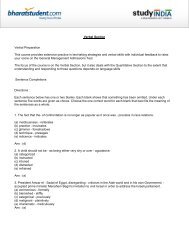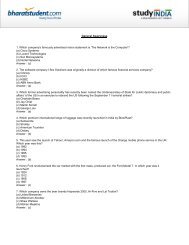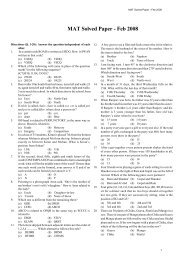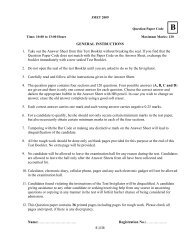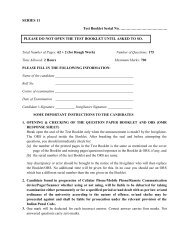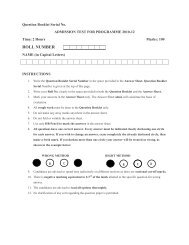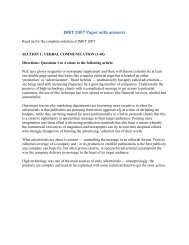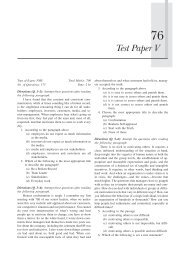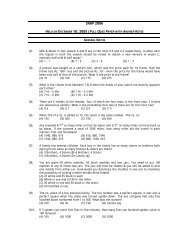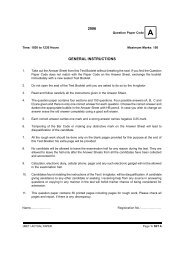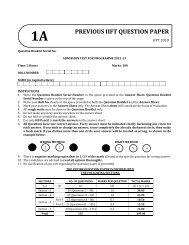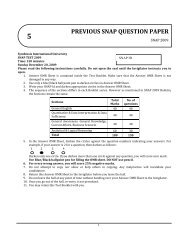PREVIOUS FMS QUESTION PAPER
PREVIOUS FMS QUESTION PAPER
PREVIOUS FMS QUESTION PAPER
Create successful ePaper yourself
Turn your PDF publications into a flip-book with our unique Google optimized e-Paper software.
(3) Different languages have created Google<br />
engine<br />
(4) Limited information is available on Google<br />
engine<br />
32. Which of the following is a correct statement?<br />
(1) Only about 50 percent of Google users belong<br />
to North America<br />
(2) Only 20 percent of Google users belong to<br />
North America<br />
(3) Only 5 percent of Google users belong to North<br />
America<br />
(4) Nearly 33 percent of Google users belong to<br />
North America<br />
33. Which of the following is a correct statement?<br />
(1) More than half of Google searches are in the<br />
English language<br />
(2) More than half of Google searches are in a Non-<br />
English language<br />
(3) Most of Google searches are in the English<br />
language<br />
(4) None of the above<br />
34. According to the passage,<br />
(1) In earlier days people were not surprised to<br />
find the information they were searching<br />
(2) Today people do not expect to find the<br />
information they are looking for<br />
(3) Today people are happy to find the<br />
information they are looking for<br />
(4) Today people expect to find the information<br />
they are looking for<br />
35. Which of the following is a correct statement?<br />
(1) The co-founders of Google were students of<br />
Stanford University<br />
(2) The co-founders of Google were professors of<br />
Stanford University<br />
(3) Larry Page and Jerry Yang were co-founders of<br />
Google<br />
(4) Eric Schmidt and Jerry Yang were co-founders<br />
of Google<br />
PP-02 2A.10<br />
<strong>FMS</strong> Dec 2010<br />
36. According to the passage, most people who search<br />
on Google belong to<br />
(1) Europe and Korea<br />
(2) Japan and Central Asia<br />
(3) Middle East and Africa<br />
(4) Europe, Korea, Japan and Central Asia<br />
Directions for Question Nos. 37 to 50: Read the<br />
following passage–4 and answer the questions given at<br />
the end of the passage. The answers should be based<br />
either on the author’s views or inferences drawn from<br />
the given passage.<br />
Passage – 4<br />
Another style which is only partially dependent on<br />
situational factors for its effectiveness is the<br />
Pioneering-Innovative management. Like Likert,<br />
Khandwalla preferred to use the expression<br />
‘management’ rather than ‘leadership’, though his<br />
theory could easily be taken for a theory of leadership<br />
styles of top executives. He accepted that the operative<br />
mode of the top management sets the tone for the<br />
lower levels. He therefore administered a<br />
questionnaire to the top level executives of 75 varied<br />
organisations. In addition to other variables, the<br />
responses disclosed a mode of functioning which he<br />
labelled as ‘PI Management.’ PI Management is<br />
characterised by a strong emphasis on attributes such<br />
as (1) Adapting freely to changing circumstances<br />
without concern for past management practices or<br />
traditions; (2) Marketing new and novel products or<br />
services; (3) Acquiring the latest, most sophisticated<br />
plant, machinery and equipment; (4) High return on<br />
investments even if they involve high risk; (5) High<br />
quality and high price orientation in marketing<br />
company’s established products or services; (6)<br />
Innovation and experimentation in every area of<br />
management; (7) Ability to come up with original<br />
solutions and novel ideas; (8) Being a pioneer within<br />
the industry in marketing technologically sophisticated<br />
products and services.<br />
Managements that score high on PI claim to pursue a<br />
business strategy of pioneering, novel, technologically<br />
sophisticated, high quality products and plants. They<br />
seem willing to take necessary risks attendant on this<br />
strategy. Since they seek to be pioneers, they cannot



